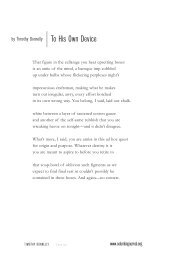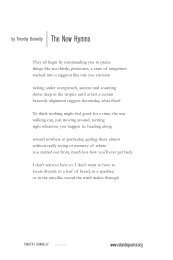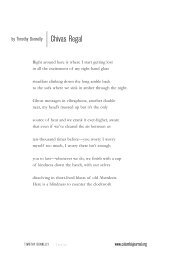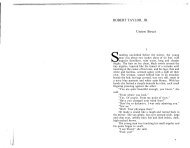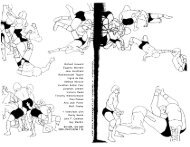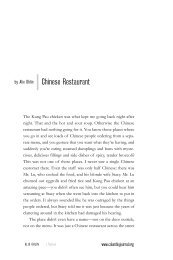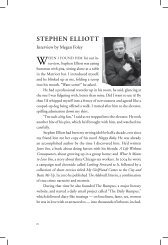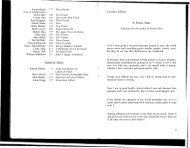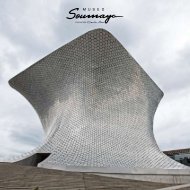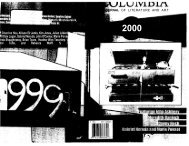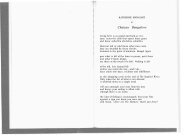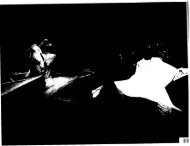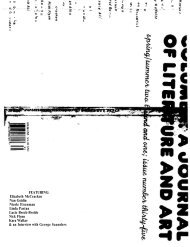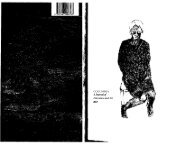Issue 27 - Columbia: A Journal of Literature and Art
Issue 27 - Columbia: A Journal of Literature and Art
Issue 27 - Columbia: A Journal of Literature and Art
Create successful ePaper yourself
Turn your PDF publications into a flip-book with our unique Google optimized e-Paper software.
o<br />
z 111<br />
o<br />
144<br />
smiled; she even got a little teary-eyed. A piece <strong>of</strong> paper folded.<br />
People coming on crutches, in go-carts, people crawling, almost,<br />
to the polls. Invisible ink. In some countries. In other countries<br />
the rivers got clogged with bodies. Parts <strong>of</strong> bodies.<br />
How after the Cold War it was the Middle War. Her husb<strong>and</strong><br />
made maps <strong>and</strong> he was always busy, redoing. She knew some <strong>of</strong><br />
his trade secrets. The way, to set a trap for the plagiarists, he always<br />
put in a place which was not there. A small, dead-end street on a<br />
city map. A little made-up isl<strong>and</strong> on a world map. He had named<br />
one such isl<strong>and</strong> after her. If these things showed up later on someone<br />
else's map, you caught them red-h<strong>and</strong>ed. He had the best<br />
sense <strong>of</strong> direction she had ever seen, must have had a brain like the<br />
globe <strong>of</strong> a compass, jiggling in water. A patient man. Meticulous.<br />
Spidery green lines, pale yellow lines, dark black. In ink when<br />
they first got married, then later sometimes on a screen. He would<br />
show her since he worked at home. Come see, after the children<br />
were asleep. Where is it? she might ask, but it did not matter. She<br />
wanted to see the colors <strong>and</strong> how small the world looked, like<br />
something you could plagiarize.<br />
Later she found out that the world was full <strong>of</strong> secret alliances<br />
<strong>and</strong> blurry borders, ones not put on any map. She had felt like an<br />
idiot for having believed that because they held each other at<br />
night, she could read her husb<strong>and</strong>'s mind. He had known; she is<br />
sure <strong>of</strong> it now. He had drawn his maps like intricate patchworks—<br />
look, hon, so many tiny countries in the world!—but he had<br />
known all along that the little countries were actually one country<br />
pretending to be many. Or something; she still wasn't sure she had<br />
it straight. Fake countries staging wars between each other while<br />
they gathered their forces underground, pretending to speak many<br />
languages, when really they spoke one. Fake translators, fake<br />
borders, fake maps, fake -wars. Until this one. It surprises her,<br />
thinking back, that people had the energy for double lives. She no<br />
longer cares about much. Care has been leeched out <strong>of</strong> her,<br />
though in the beginning she found it all exciting. Finally<br />
something close to home, her city on the news. Soldiers. A sense<br />
<strong>of</strong> living history. She had been brave, gone out at night through<br />
the dark streets to bring canned food to people in the rubble, like<br />
Joan <strong>of</strong> Arc or Mother Gourage. Stupid. She had been stupid.<br />
When she got back, only the little girl was left. She did not<br />
know if her other children had gone <strong>of</strong>f <strong>and</strong> were living like mice<br />
in the debris, or if they had been taken away. She did not know<br />
where her husb<strong>and</strong>, the mapmaker, had disappeared to, or her<br />
chocolate labrador dog. She knew her husb<strong>and</strong> had secrets, ones<br />
he kept from her, about ways to draw the earth. She remembered<br />
a story they had read together once, about an uncharted space, a<br />
diamond the size <strong>of</strong> a mountain, kept by its owner <strong>of</strong>f the maps.<br />
Not so far-fetched, he had said, but he would not tell her more.<br />
When she returned to the house to find him gone, his computer<br />
was missing, too. She had noticed that, though she had not<br />
noticed much.<br />
Just grabbed the girl, who was asleep in her room, grabbed<br />
their passports, left a note, stood in a snaking line <strong>and</strong> tried to get<br />
money from the bank machine, which said Out <strong>of</strong> Cash in amber<br />
letters. Sorry Please Come Again. Not logical; it would have been<br />
smarter to stay put in the house. She had gotten lost, had never<br />
had a sense <strong>of</strong> direction <strong>and</strong> anyway nothing looked the same. She<br />
had needed to look for them. A year ago, maybe, by now. Two<br />
years ago, maybe, or six months. For a while she had kept track<br />
on the garage wall, marked days in matchstick lines like a prisoner<br />
in a movie, but then she had stopped <strong>and</strong> painted over the lines in<br />
a fat blue swathe.<br />
Perhaps he had gone somewhere uncharted with the other<br />
children. In the beginning the thought had comforted her, to<br />
picture them away <strong>and</strong> safe. Then it had begun to make her<br />
angry—to have been left behind that way—<strong>and</strong> she had imagined<br />
smashing in his computer screen with a hammer <strong>and</strong> biting teethmarks<br />
into the fine brown film you could see when you slid the<br />
metal back on his diskettes. At some point her daughter's teeth<br />
had started dropping out like rotten fruit. Baby teeth. At first it<br />
had appalled <strong>and</strong> amazed <strong>and</strong> excited her, that those teeth would<br />
drop <strong>and</strong> the other ones, in the midst <strong>of</strong> all this, would find the<br />
energy to push through.



